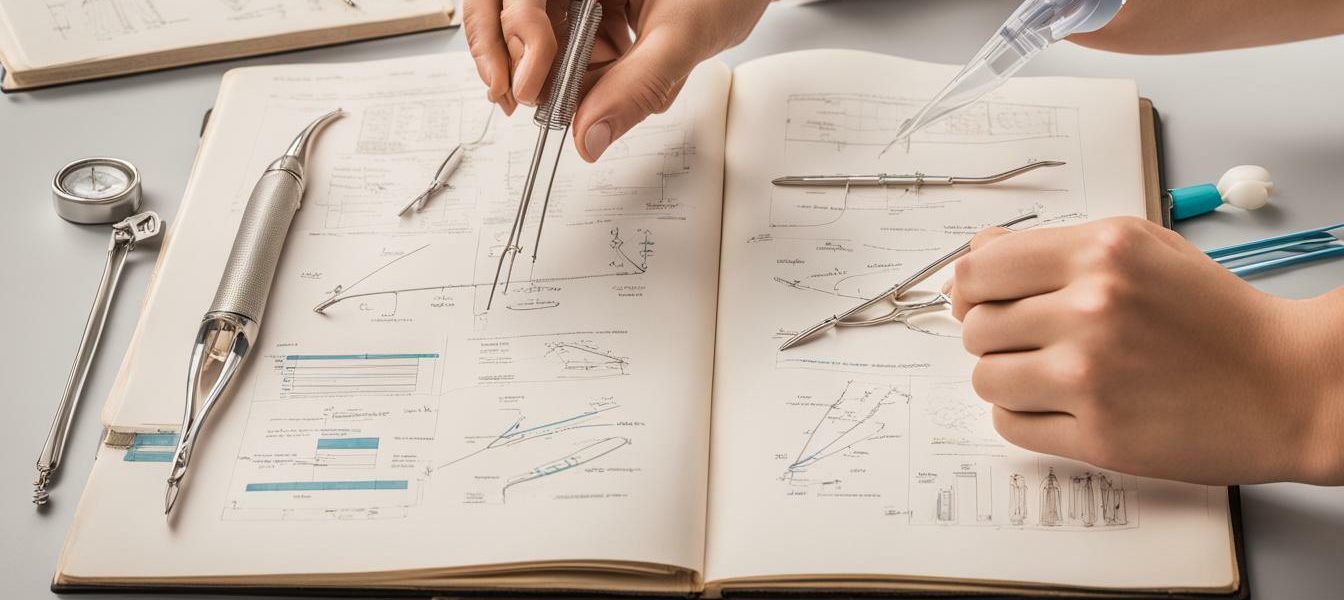
Is Dental Hygiene School Hard?
Choosing a career in dental hygiene can be a rewarding path, but it’s important to know the challenges that come with it. Dental hygiene school requires a significant amount of time, energy, and dedication. It is a rigorous program that requires both academic and clinical skills to succeed.
However, the benefits of completing a dental hygiene program can be worth the effort. Dental hygienists have a fulfilling career helping others with their oral health and enjoy job stability and competitive salaries.
Key Takeaways:
- Dental hygiene school is a challenging program that requires dedication and perseverance.
- It demands a combination of academic and clinical skills to succeed.
- Despite the difficulties, completing a dental hygiene program can lead to a rewarding career with job stability and competitive salaries.
Understanding the Demands of Dental Hygiene Education
Entering a dental hygiene program can be an intimidating experience, but understanding the demands of the curriculum can help you prepare for the journey ahead. The intense curriculum consists of both academic and clinical components, requiring students to develop a wide range of skills to succeed.
Academic Demands
The academic portion of the dental hygiene program involves rigorous coursework, including anatomy, microbiology, radiography, and pharmacology. Students must also complete research projects and case studies to enhance their critical thinking and problem-solving skills. The program typically lasts for two years and culminates in a final exam, requiring students to demonstrate their knowledge and skills in a comprehensive examination.
Clinical Demands
The clinical portion of the dental hygiene program is equally demanding, requiring students to master a wide range of skills, including prophylaxis, local anesthesia administration, and dental radiography. As students progress through the program, they are required to work directly with patients, providing routine prophylaxis and periodontal therapy treatments under the supervision of licensed dental hygienists and dentists.
The clinical component of the program requires students to develop technical expertise, communication skills, and a strong sense of professionalism. The clinical practice provides opportunities to interact with patients, gain clinical experience, and develop confidence in their abilities.
Overall, dental hygiene education is challenging, with demanding academic and clinical components. However, with dedication, hard work, and a passion for oral health, students can successfully navigate the program, acquire a wide range of skills, and enjoy a rewarding career in dental hygiene.
Overcoming Obstacles in Dental Hygiene School
Dental hygiene school can be challenging and demanding. Students are expected to balance their academic coursework with clinical responsibilities and maintain a high level of professionalism throughout the program. However, with the right mindset and strategies, students can overcome these obstacles and succeed in their studies.
Time Management
One of the biggest challenges dental hygiene students face is time management. With a demanding curriculum and clinical hours, it can be difficult to balance academic responsibilities with personal obligations. To overcome this obstacle, students should create a schedule that includes designated study times, clinical hours, and personal time. It’s also important to prioritize tasks and avoid procrastination.
Study Skills
Effective study skills are crucial for success in dental hygiene school. Students must have a strong understanding of the coursework and be able to apply their knowledge in clinical settings. To improve their study skills, students should take advantage of resources such as textbooks, lecture notes, and online study materials. They should also develop a study schedule and practice active learning techniques such as flashcards and mnemonic devices.
Personal and Academic Responsibilities
It can be difficult to balance personal and academic responsibilities during dental hygiene school. Students must find ways to manage their stress levels and maintain a positive mindset. It’s important to take breaks and engage in self-care activities such as exercise, meditation, or spending time with friends and family. Students should also seek support from instructors or peers when needed.
“Success is not final, failure is not fatal: It’s the courage to continue that counts.” – Winston Churchill
Overcoming obstacles in dental hygiene school requires dedication, perseverance, and a willingness to learn and grow. By developing effective time management skills, improving study habits, and finding ways to balance personal and academic responsibilities, students can overcome challenges and succeed in their studies.
The Intensity of the Dental Hygiene Curriculum
The dental hygiene curriculum is known for its intensity, demanding a lot from students in terms of academic rigor and clinical skills. The program is designed to prepare future dental hygienists to provide quality care to patients, which requires a comprehensive understanding of the field and proficiency in a wide range of skills.
The coursework in dental hygiene school covers a variety of subjects, including anatomy, medical terminology, radiology, and oral pathology. Students are expected to learn and retain a significant amount of information in a relatively short period of time, which can be daunting for some. In addition to traditional classroom lectures, students also participate in hands-on clinical experiences that require a high level of precision and attention to detail.
Clinical hours play a crucial role in the dental hygiene curriculum, as they provide students with the opportunity to practice their skills and gain hands-on experience. However, managing clinical hours along with the workload of academic coursework can be challenging. Students must carefully balance their academic and clinical responsibilities, often working long hours to meet the demands of the program.
To succeed in the intense dental hygiene curriculum, dedication and perseverance are essential. Students must be able to manage their time effectively, prioritize tasks, and stay focused on their goals. It’s important to seek support from instructors and peers when needed, as well as develop effective study habits and stress-management techniques.
While the intensity of the dental hygiene curriculum may seem daunting, it’s important to remember that the rewards of this field can be significant. With dedication and hard work, students can graduate confident in their abilities to provide quality care to patients and make a positive impact on the field of dental hygiene.
Managing Stress in Dental Hygiene Program
Dental hygiene school can be a stressful experience, but there are several strategies you can use to manage stress and maintain your mental health.
Practice self-care. Make time for activities that bring you joy and help you relax. This might include exercise, spending time with loved ones, or engaging in creative hobbies.
Use stress reduction techniques. Deep breathing exercises, meditation, and yoga can all be effective in reducing stress levels. Find techniques that work for you and incorporate them into your daily routine.
Seek support. Talk to your classmates, instructors, or a mental health professional if you are feeling overwhelmed. Remember that seeking help is a sign of strength, not weakness.
Stay organized. Use a planner or scheduling app to manage your time and deadlines. Breaking down larger tasks into smaller, manageable steps can also help reduce stress and prevent procrastination.
By incorporating these strategies into your routine, you can manage stress and maintain your well-being while pursuing your dental hygiene education.
Strategies for Success in Dental Hygiene School
Successfully navigating dental hygiene school requires dedication and perseverance. While the program can be challenging, there are some key strategies that students can use to improve their chances of success.
1. Develop Effective Study Habits
Studying is an essential part of dental hygiene school, but it’s not enough to simply read through your notes and hope for the best. To really absorb the material, it’s important to develop effective study habits. This might include:
- Creating a study schedule and sticking to it
- Using active study techniques, such as quizzing yourself or creating flashcards
- Taking breaks to avoid burnout
- Participating in study groups or seeking help from instructors when necessary
2. Time Management Is Key
Dental hygiene school requires students to juggle a variety of responsibilities, from attending lectures and labs to completing clinical hours and studying for exams. To be successful, students need to develop strong time management skills. This might involve:
- Creating a daily or weekly schedule that outlines all your tasks and responsibilities
- Breaking larger assignments into smaller, more manageable tasks
- Setting realistic deadlines for yourself
- Learning to prioritize tasks based on urgency and importance
3. Maximize Your Clinical Experiences
Clinical experiences are a critical component of dental hygiene school. They provide students with hands-on experience working with patients and applying the concepts they’ve learned in the classroom. To make the most of these experiences, students should:
- Be prepared and organized for each clinical session
- Ask questions and seek feedback from instructors and peers
- Take advantage of opportunities to work with diverse patient populations
- Reflect on each experience and use it to inform your future practice
4. Practice Self-Care
Dental hygiene school can be stressful, and it’s important to take care of yourself both physically and mentally. This might include:
- Making time for exercise, healthy eating, and adequate sleep
- Engaging in stress-relieving activities such as meditation, yoga or deep breathing exercises
- Building and maintaining a support network of family, friends, and peers
- Seeking help from mental health professionals and other resources when needed
By using these strategies and staying focused on your goals, you can succeed in dental hygiene school and prepare for a rewarding career in oral health.
Meeting Dental Hygiene School Expectations
Meeting expectations is critical in dental hygiene school. It is essential for students to be present and on time for all classes and clinical rotations. Instructors expect students to be professional in attire, attitude, and behavior.
Clinical performance is also a significant expectation. Students must exhibit competency in various clinical skills, including patient assessment, instrumentation, and treatment planning. Instructors assess students regularly and expect them to demonstrate a high level of professionalism, ethics, and communication skills.
Meeting these expectations is necessary for success in dental hygiene school. Failure to meet these expectations can lead to dismissals or poor evaluations, which can affect job prospects after graduation.
Balancing Workload in Dental Hygiene School
Dental hygiene school can be demanding, with a rigorous curriculum that requires both academic and clinical excellence. Balancing the workload can be a challenge, but with the right strategies, it is possible to manage your time effectively and succeed in the program.
Time Management Techniques
Effective time management is essential for balancing the workload in dental hygiene school. Some helpful techniques include:
- Creating a study schedule: This will help you prioritize your time and ensure that you have enough time to complete all your assignments and prepare for exams.
- Breaking up tasks: Rather than trying to tackle an entire project or assignment in one sitting, break it up into smaller, more manageable tasks that you can complete over time.
- Utilizing downtime: Use any downtime you have during the day to review notes or study. This can include waiting for class to start or breaks in between patients during clinicals.
Prioritization of Tasks
When you have multiple tasks to complete, it’s essential to prioritize them based on their importance and deadlines. One helpful method is the Eisenhower Matrix, which categorizes tasks into four quadrants:
| Urgent | Not Urgent |
|---|---|
| Important | Quadrant 1: Do first |
| Not Important | Quadrant 3: Delegate or delete |
| Quadrant 2: Schedule for later | |
| Quadrant 4: Ignore |
By using this method, you can prioritize your tasks and ensure that you are completing the most important and urgent ones first.
Balancing Clinical and Academic Responsibilities
One of the unique challenges of dental hygiene school is balancing clinical and academic responsibilities. To manage these demands, it’s important to:
- Stay organized: Keep track of upcoming exams, assignments, and clinical requirements in a planner or calendar.
- Maximize clinical experiences: Use your clinical experiences to reinforce concepts learned in the classroom and prepare for patient care.
- Use a support system: Lean on your peers and instructors for support when balancing clinical and academic responsibilities becomes overwhelming.
By implementing these strategies, you can manage your workload effectively and thrive in dental hygiene school.
The Rewards of Dental Hygiene Education
Completing a dental hygiene program is no easy feat, but the hard work and dedication are well worth it. There are numerous rewards to obtaining a degree in dental hygiene, both professionally and personally.
Opportunities for Growth
As a dental hygienist, there are plenty of opportunities for career growth and advancement. With additional education and experience, you can pursue a career in education, research, or public health. You may also have the opportunity to specialize in areas such as periodontics or pediatric dentistry.
Job Stability
The demand for dental hygienists continues to grow, providing job security for those with a degree in dental hygiene. The Bureau of Labor Statistics projects employment growth of 6 percent from 2019 to 2029, which is faster than the average for all occupations.
Making a Positive Impact
One of the most rewarding aspects of a career in dental hygiene is the ability to make a positive impact on patients’ oral health. As a dental hygienist, you have the opportunity to educate patients on the importance of oral hygiene and help them achieve healthy smiles.
Personal Fulfillment
Completing a dental hygiene program requires hard work, dedication, and perseverance. The sense of accomplishment that comes with completing a rigorous program is immensely gratifying. Knowing that you have the skills and knowledge to make a difference in people’s lives can provide a great sense of personal fulfillment.
Overall, while dental hygiene school may be challenging, the rewards are numerous. With dedication and perseverance, you can achieve a fulfilling career in dental hygiene and make a positive impact on patients’ lives.



